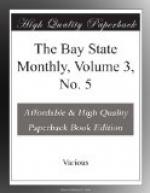Of the myriad of bound volumes and pamphlets called forth by the war, a very large number have long since been consigned to oblivion. Many of these were written to bolster up personal ambitions, interests, rivalries and jealousies, while as many more were composed, without regard to facts, to gain dollars and cents. Of none of these productions need anything further be said.
Comparatively speaking, there were but few books relating to the war and published during the war that deserve to be recalled. After the war, quite a number were issued, and, within the last ten years, a large number have appeared, all destined to rank as “authorities” for the future historian. The purpose of the present series of articles is, to give such information in regard to these publications, as shall guide students in mapping out a course of reading, and shall assist persons entrusted with the selection of standard books on war history for use in city and town libraries.
The suggestions and information herein offered are, at their best, only random notes. No special plan, or classification, will be followed by the writer; his sole aim being to include only what is absolutely worthy and “authoritative.”
The American conflict:—A History of the Great Rebellion in the United States of America, 1860-64: Its Causes, Incidents, and Results. Intended to exhibit especially its Moral and Political Phases, with the Drift and Progress of American opinion respecting Human Slavery, from 1776 to the close of the War for the Union. By Horace Greeley. Illustrated, 2 volumes. pp. 648, 679. Hartford: O.D. Case and Company.
This work was composed, with the aid of an amanuensis, in the early hours of the morning, before the beginning of the editorial tasks of each day. Mr. Greeley’s long connection with the Tribune, as its editor-in-chief, tended to make him more familiar with American politics from 1830 to 1860 than almost any other of his contemporaries, and when he proposed to himself to write the history of the American civil war, he could justly claim to have full knowledge of the causes which had led to it. In the preface to his first volume (1864) he stated frankly that “the History of the civil war will not and cannot now be written.” All that he hoped to accomplish, then, was to write a political rather than a military history of the great struggle. He succeeded, and his work deserves to rank as one of the most valuable, and, so far as it goes, accurate and impartial narratives of the contest.
The first volume treats chiefly of the causes and events which culminated in secession, while the second volume (1866) depicts, without embellishment, the military and political victories which ended in the restoration of peace. The author cherished the belief that the war was “the unavoidable result of antagonisms imbedded in the very nature of our heterogeneous institutions: that ours was indeed an ’irrepressible conflict,’ which might have been prevented.”




